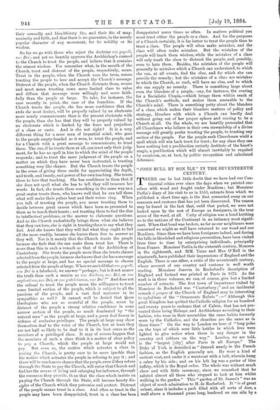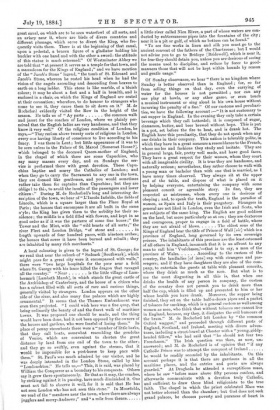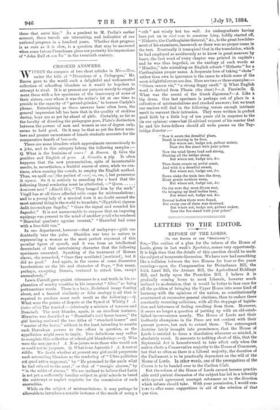"JOHN BULL ET SON ILE" IN THE SEVENTEENTH CENTURY.
THERE can be but little doubt that we have had our Con- tinental critics ever since the days when we painted our- selves with woad and fought under Boadicea ; but Monsieur Perlin's diary of his visit to us in 1553, extracts from which we published a short time ago, is the first connected essay on our manners and customs that has yet been discovered. The reason may be found in the fact that, until that period, we were not looked upon by the rest of Europe as foreigners, in the true sense of the word, at all. Unity of religion was a bond knitting us to the nations of the Continent in an intimacy most signifi- cant. When that bond was broken, as far as our neighbours were concerned we might as well have returned to our woad and our Boadicea. Since then we have been foreigners indeed, and during the lulls in bloodshed and religious persecution, have been visited from time to time by enterprising individuals, principally from France. Monsieur Perlin in the sixteenth century, Monceca in the eighteenth, and MM. Taine and Max O'Rell in the nineteenth, have published their impressions of England and the English. There is one other, a critic of the seventeenth century, whose account of our country and customs is well worth reading. Monsieur Jorevin de Rocheford's description of England and Ireland was printed at Paris in 1672. As the work is in three volumes, we can, of course, give but a limited number of extracts. The first town of importance visited by Monsieur de Rocheford was " Cantorbery ;" and an incidental remark a propos of the Church of England may be interesting to upholders of the " Ornaments Rubric " :—" Although this great Kingdom has quitted the Catholic religion for an hundred and twenty years to embrace that of Calvin, that has not pre- vented there being Bishops. and Archbishops according to their fashion, who wear in their assemblies the same habits formerly worn by the Catholics, and the churches are the same as in those times." On the way to London we hear of " long poles on the tops of which were little kettles in which fires were lighted to give notice when there is any danger in the country and robbers on the way." London, we are told, is the "largest [city] after Paris in all Europe." The Duke of York is described as " dressed nearly in the French fashion, as the English generally are. He wore a kind of surtout coat, and under it a waistcoat with a belt, wherein hung a sabre by his side ; and on his left leg was a garter of blue taffety, which is the Royal order. The whole was without much show and with little ceremony, since we remarked that he saluted almost all those who stopped to look at him whilst walking in the garden." This " garden of St. James's " was an object of much admiration to M. de Rocheford. It " is of great extent, since it includes a park filled with all sorts of deer, a mall above a thousand paces long, bordered on one side by a
great canal, on which are to be seen waterfowl of all sorts, and an aviary near it, where are birds of divers countries and different plumage, which serve to divert the King, who fre- quently visits them. There is at the beginning of that canal, upon a pedestal, a brazen figure of a gladiator holding his buckler with one hand and with the other a sword: the attitude of this statue is much esteemed." Of Westminster Abbey we are told that " at present it serves as a temple for that town, and a mausoleum for the Kings of England ;" and we have mention of the "Jacob's Stone" legend, "the tomb of St. Edouard and Jacob's Stone, whereon he rested his head when he had the vision of the angels ascending and descending from heaven to earth on a long ladder. This stone is like marble, of a bluish colour; it may be about a foot and a half in breadth, and is enclosed in a chair, on which the Kings of England are seated at their coronation ; wherefore, to do honour to strangers who come to see it, they cause them to sit down on it." M. de Rocheford evidently visited the Row in the height of the
season. He tells us of " Ay parte the common walk and jaunt for the coaches of London, where we plainly per- ceived that the English ladies are very handsome, and that they know it very well." Of the religious condition of London, he says,—" They reckon above twenty sorts of religions in London, every one having liberty of conscience to live according to his fancy. I was there in Lent ; but little appearance of it was to be seen unless in the Palace of St. Marcel [Somerset House ?], which belonged to the deceased Queen-mother of England, in the chapel of which there are some Capuchins, who say many masses every day, and on Sundays the ser- vice is performed there with great devotion. These Capu- chins baptise and marry the Catholics of London ; and when they go to carry the Sacrament to any one in the town, they are dressed like gentlemen, and you would sometimes rather take them for captains than Capuchins ; but they are oblige l to this, to avoid the insults of the passengers and lower citizens." During M. de Rocheford's long and interesting de- scr:ption of the town, we hear of "L'Incoln Infields, the fields of Lincoln, which is a square larger than the Place Royal at Paris ; the houses that encompass it are all built in the same style ; the King has given them to the nobility for their re- sidence ; the middle is a field filled with flowers, and kept in as good order as if it was the parterre of some fine house ;" the Tower and the Mint, with the "wild beasts of all sorts ;" the
river Fleet and London Bridge, "of stone and in length upwards of four hundred paces, with nineteen arches ; the houses that cover it have been burned and rebuilt ; they are inhabited by many rich merchants."
A local colouring is given to the legend of St. George; for we read that near the suburb of " Sodoark [Southwark], which might pass for a great city were it encompassed with walls," there were "two large hospitals for the poor near a field where St. George with his lance killed the dragon that ravaged
all the country." "Near is the little village of Lam- bermark [Lambeth Marsh], in which stands the great castle of the Archbishop of Canterbury, and the house of a citizen who has a cabinet filled with all sorts of rare and curious things, generally visited by strangers. London appears on the other side of the river, and also many fine palaces which are highly ornamental." It seems that the Thames Embankment was even then projected. "I could wish here was a fine quay, that being ordinarily the beauty of and the finest walk of maritime towns. It was proposed one should be made, and the thing would have been done, had it not been opposed by the owners of the houses and gardens, who were fearful of losing them." In place of penny steamboats there were a" number of little barks, that they call boats, somewhat resembling the gondolas of Venice, which are convenient to shorten the great distance by land from one end of the town to the other; and they go so swiftly, even against the stream, that it would be impossible for a post-horse to keep pace with them." St. Paul's was much admired by our visitor, and he was deeply interested in the London Stone, called by him " Londonehton." He tells us,—" This, it is said, was placed by William the Conqueror as a boundary to his conquests. Others say it grew there spontaneously. Be that as it may, the coaches, by striking against it in passing, have much diminished it. One must not fail to observe it well, for it is said that He has not seen London who has not seen this stone." In Moorfields, we read of the " meadows near the town, where there are always
jugglers and merry-Andrews ;" and " a mile from thence a little river called Nieu River, a part of whose waters are con- ducted by subterraneous pipes into the fountains of the city; near it is a pit or gulf, of which no bottom can be found."
"To see fine works in linen and silk you must go to the ancient convent of the fathers of the Chartreuse ; but I would not advise you to go to Bridoye [Bridewell], which is near it, for fear they should detain you, unless you are desirous of seeing the means used to discipline, and reduce by force to good- manners those that will not be kept within bounds by reason and gentle usage."
Of Sunday observance, we hear "there is no kingdom where Sunday is better observed than in England ; for, so far from selling things on that day, even the carrying of water for the houses is not permitted ; nor can any one play at bowls, or any other game, or even touch a musical instrument or sing aloud in his own house without incurring the penalty of a fine." Of our customs and peculiari- ties, we have the following account :—" It is not customary to eat supper in England. In the evening they only take a certain beverage which they call botterdel ; it is composed of sugar, cinnamon, butter, and beer brewed without hops. This is put in a pot, set before the fire to heat, and is drank hot. The English have this peculiarity, that they do not speak when any one drinks in their company. This nation is tolerably polite, in which they have in a great measure a resemblance to the French, whose modes and fashions they study and imitate. They are in general large, fair, pretty well made, and have good faces. They have a great respect for their women, whom they court with all imaginable civility. It is true they are handsome, and naturally serious ; nevertheless, they rather choose to walk with a young man or bachelor than with one that is married, as I have many times observed. They always sit at the upper end of the table, and dispose of what is placed on it by helping everyone, entertaining the company with some pleasant conceit or agreeable story. In fine, they are respected as mistresses, whom every one is desirous of obeying ; and, to speak the truth, England is the paradise of women, as Spain and Italy is their purgatory. Strangers in general are not liked in London, even the Irish and Scots, who are subjects of the same king. The English are good soldiers on the land, but more particularly so at sea ; they are dexterous and courageous, proper to engage in a field of battle, where they are not afraid of blows The eldest sons of the Kings of England bear the title of Prince of Wall [sic] which is a province of England, long governed by its own sovereign princes. The inhabitants of this province are the least esteemed of all others in England, insomuch that it is an affront to any man to call him Vvelchmen,'—that is to say, a man of the
province of Wales According to the custom of the country, the landladies [of inns] sup with strangers and pas- sengers; and if they have daughters they are also of the com- pany, to entertain the guests at table with pleasant conceits, where they drink as much as the men. But what is to me the most disgusting in all this is, that when one drinks the health of any person in company, the custom of the country does not permit you to drink more than half the cup, which is filled up and presented to him or her whose health you have drank. Moreover, the supper being finished, they set on the table half-a-dozen pipes and a packet of tobacco for smoking, which is a general custom as well among women as men, who think that without tobacco one cannot live in England, because, say they, it dissipates the evil humours of the brain." M. de Rocheford left London by "the common Oxford waggon," and proceeded through different parts of England, Scotland, and Ireland, meeting with divers adven- tures, including a street-brawl at Chester with a " young, giddy- headed fellow," who had said that " he should not fear two Frenchmen." The Irish question was then, as now, un- answered ; and M. de Rocheford is of opinion that " if any
Catholic Prince was to attempt the conquest of Ireland he would be readily seconded by the inhabitants. On this account perhaps it is that there are garrisons in all the maritime places, and the entries and ports are always guarded." At Drogheda he attended a surreptitious mass, where he saw "before mass above fifty persons confess, and afterwards communicate with a devotion truly Catholic, and sufficient to draw these blind religionists to the true faith. The chapel in which the priest celebrated Mass was not better adorned than the chamber; but God does not seek grand palaces, he chooses poverty and pureness of heart in
those that serve him." As a pendent to M. Perlin's earlier account, these travels are interesting, and indicative of our national progress in a hundred years. Whether that progress is as sure as it is slow, is a question that may be answered when some future Frenchman gives our posterity his impressions of "John Bull et son Ile in the twentieth century.




































 Previous page
Previous page